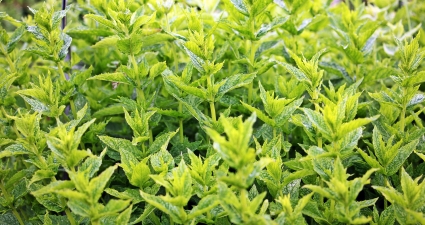Peppermint is an aromatic leafy plant in the Lamiaceae family. It is known for its fresh, minty aroma, which is often used in oral care products and beverages. Peppermint grows well in shady, damp locations, and can be easily cultivated in a pot or garden. It is also used in cooking to flavor dishes and drinks.
Peppermint : origin and history
Peppermint is native to North Africa and the Middle East. It has been used since Antiquity for its medicinal and culinary properties. It was also used as a decorative plant and to perfume homes. Peppermint was introduced to Europe by the Romans, who used it to flavor food and drink, as well as for its medicinal properties. Since then, it has been cultivated in many countries around the world.
Peppermint oil composition
Peppermint essential oil is obtained by steam distillation of the leaves of the peppermint plant. It is composed mainly of menthol, menthone and menthyl acetate. It also contains many other aromatic compounds such as isomenthone, neomenthone, isomenthyl acetate and neomenthyl acetate. Peppermint oil has a fresh, minty aroma, as well as strong analgesic and anesthetic activity. It is often used to relieve headaches, nausea and vomiting, and to improve blood circulation.
Discover the benefits of peppermint oil
How do I use peppermint oil ?
There are several ways to use peppermint oil :
- Inhalation : you can use a few drops of peppermint oil on a handkerchief or aromatherapy cushion to inhale its refreshing scent.
- Massage : you can use peppermint oil diluted in a carrier oil (such as sweet almond oil) to massage sore muscles or aching joints.
- Bath : you can add a few drops of peppermint oil to your bath to benefit from its relaxing effects.
- Cleaning : you can use peppermint oil diluted in hot water to clean and disinfect your work surfaces.
It's important to note that peppermint oil must be diluted before being applied to the skin, as it can be irritating in pure concentration. In addition, a patch test is recommended before using the oil on a large area of skin, and it should not be used on pregnant women, children under 6 and people with a history of epilepsy.
Home recipes using peppermint oil
Here are a few recipes based on peppermint oil that you can try at home :
- Peppermint infusion : mix a drop of peppermint oil with a teaspoon of honey and a cup of hot water. Drink this infusion to relieve headaches and upset stomachs.
- Disinfecting hand gel : mix a tablespoon of peppermint oil with a cup of 70% alcohol and a tablespoon of aloe vera gel. Apply this mixture to hands to disinfect and refresh.
- Peppermint inhalation : Add a few drops of peppermint oil to a pan of hot water and inhale the vapors to relieve nasal congestion and headaches.
- Foot balm : mix a tablespoon of peppermint oil with a tablespoon of shea butter and a tablespoon of olive oil. Apply this mixture to the feet and wrap in socks for intense hydration.
- Moisturizing hair mask : mix a tablespoon of peppermint oil with a tablespoon of argan oil and a tablespoon of honey. Apply this mixture to hair and leave on for 20 minutes before rinsing. This will help to deeply nourish and moisturize the hair.
Precautions to take before using peppermint essential oil
Here are a few precautions to take when using peppermint oil :
- Drug interactions : Peppermint oil may interact with certain drugs, particularly those metabolized by the liver. If you are taking medication, talk to your doctor before using peppermint oil.
- Skin sensitivity : Some people may be sensitive to peppermint oil and may develop a skin reaction when using it. If you have sensitive skin, it is recommended that you dilute it before applying it to your skin.
- Pregnancy and breast-feeding Peppermint oil is contraindicated during pregnancy and breastfeeding, as it may have adverse effects on the fetus and may pass into breast milk.
- Children : Peppermint oil should be used with caution in children, as it can cause irritation and allergic reactions. If you wish to use it for children, be sure to dilute it properly and consult a doctor or healthcare professional before use.
- Liver problems : If you have liver problems, use peppermint oil with caution, as it can be harmful to the liver if used excessively. Consult a physician or healthcare professional before use if you have liver problems.
Scientific research on Peppermint

There have been many scientific studies on the health effects of peppermint. Here are just a few examples of research findings :
- Headache relief : several studies have suggested that inhalation of peppermint essential oil can be effective in relieving headaches and migraines.
- Improved digestion : peppermint has digestive properties and can be useful for relieving stomach aches and improving digestion.
- Nausea relief : some studies have suggested that inhalation of peppermint essential oil can be effective in relieving nausea and vomiting.
- Cough and cold relief : peppermint is often used to relieve cough and cold symptoms, thanks to its expectorant and decongestant properties.
It should be noted that the results of these studies are promising, but that further research is needed to conclusively establish the health effects of peppermint. In general, it is advisable to consult a health professional before taking any supplements or changing your diet.







